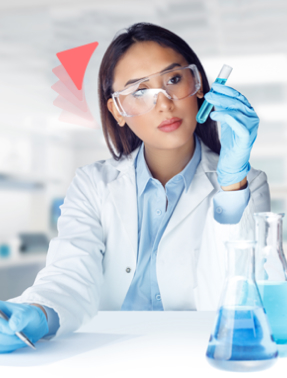



MSc / PGDip Medical Laboratory Science




















MSc: £9,588
PGDip: £7,188
Enrolment Fee: £560
Accredited as a top-quality online, distance, and blended learning.
Our programme is tailored to help eligible individuals.
Flexible part – time distance learning.
Opportunity for 60 to 300 hours of internships.
MSc: 180 CAT (90 ECTS)
PGDip: 120 CAT (60 ECTS)
Programme Description
This programme is designed to equip you with the skills and knowledge needed to succeed in clinical analysis, with a focus on practical experience. You will have the opportunity to develop your skills in a range of areas, including haematology, biochemistry, genetics, immunology, microbiology, mycology, and parasitology. By the end of the programme, you will have the practical knowledge and expertise necessary to excel in this rapidly growing sector.
Who is this for?
Entry requirement: a bachelor’s degree or equivalent.
This Postgraduate Certificate in Medical Laboratory Science is ideally suited to those who want to develop a professional future within:
- Laboratories or Research Centres.
- DNA technology and Genetic Engineering companies.
- Clinics and Physicians Officers.
- Pharmaceutical companies.
- Diagnostic departments of companies in the Healthcare Industry.
- Stem Cell banks.
- Genetic Diagnostic Laboratories.
- Medical Technologist
- Biomedical Technology
- Lab Technician
- Medical Laboratories

Syllabus
As your journey progresses, you will discover different modules which will help you, step by step, to reach your final goal.
Part I
1. Equipment and lab material
2. Analysis of biological samples
3. Basic techniques of lab
4. Cleaning, Disinfection and Sterilization
5. Bibliographic searches in PubMed
6. Basic concepts of statistics
Part II
1. Blood
2. Blood samples
3. Blood Analysis – Haematological Tests
4. Blood count
5. Haemostasis and Coagulation Study
6. Study of Cellular Morphology
7. Determination of Blood Type and Rh Factor
Part III
1. Basic Concepts in Biochemistry
2. Biochemical Techniques
3. Chromatography
4. Spectrometry
5. Ionogram
6. Enzymatic Methods
7. Applications of Biochemical Techniques to Clinical Analyses
8. Blood Plasma Determinations
9. Hormonal Determinations
10. Study of Urine and Renal Function
11. Study of Liver Function
12. Cardiac Damage Markers
13. CSF Study
Part IV
1. The cell
2. Cell growth techniques
3. Techniques in Cytology I
4. Techniques in Cytology II
Part I
1. Basic concepts of Immunology
2. Immunological Techniques
3. ELISA
4. Western-blot
5. Other immunological techniques
6. Applications of Immunological Techniques
7. Allergies
Part II
1. Basic concepts of Genetics and Molecular Biology
2. Genetic Techniques and Molecular Biology
3. Study of the Chromosomes
4. PCR
5. Sequencing and RFLPs
6. Application of Genetic Techniques and Molecular Biology
7. Cancer
8. Forensic Applications
Part I
1. Introduction to Microbiology and Parasitology
2. Laboratory Materials and Equipment of Microbiology and Parasitology
3. Microbial Growth Control
4. Chemotherapeutic Agents
5. Epidemiology and pathogenesis
Part II
1. Introduction to Bacteriology
2. Nutritional requirements and bacterial growth media
3. Growth media used in clinical practice
4. Microbial growth conditions
5. Bacterial counts
6. Inoculation and seeding techniques
7. Antibiotics
8. Microbiological diagnosis
9. Fresh Visualisation Method
10. Staining techniques
11. Biochemical diagnostic techniques
12. Immunological diagnostic techniques
13. Molecular techniques
14. Bacterial transformation: utility and procedure
Part III
1. Introduction to Virology
2. Virus Growth
3. Viral Infection
4. Viral Diagnosis
Part IV
1. Introduction to mycology
2. Culture of to Fungi and Yeasts
3. Mycological Culture Methods
4. Antifungi – General Concepts and Reference Methods
5. Antifungi – CLSI and EUCAST Standardised Methods and Commercial Methods
6. Mycological Diagnosis – General Concepts
7. Mycological Diagnosis – Observation and Growth
8. Mycological Diagnostics – Biochemical, Immunological and Molecular Techniques
Part I
1. Introduction to Parasitology
2. Host-parasite interaction
3. Protozoa (Part I): Amoebae and Microsporidia
4. Protozoa (Part II):Ciliated Parasites
5. Protozoa (Part III): Flagellates of digestive and genitourinary tracts
6. Protozoa (Part IV): Hemoflagellates
7. Protozoa (Part V): Apicomplexa
8. Platyhelminthes (Part I): Trematodes
9. Platyhelminthes (Part II): Cestodes
10. Nematodes (Part I)
11. Nematodes (Part II)
12. Annelids and Parasitic Arthropods
13. Arthropod vectors
Student Reviews
Students who select our programme are employed here:


Payment Options
Invest in your future and spread the cost with our flexible payment options. Secure your place on our programme today with a minimal deposit.
Educational Partners
We share our journey with companies who hold same values as us in order to give our students greater opportunities for growth, both professionally and personally.
Accreditations
Our BAC and University of Chichester (UK) accreditation ensures exceptional education. BAC endorses our online and blended learning, while University of Chichester accredits our MSc’s programmes, boosting employability and CATS credits recognition
Choose your path with our Exclusive Programme
- 100% flexible distance learning
- Flexible Payment Options
- Financial Aid Available
- Level 7 qualification
- Recognised Accreditations
- MSc: 180 CAT (90 ECTS)
PGDip: 120 CAT (60 ECTS) - Optional Internships














